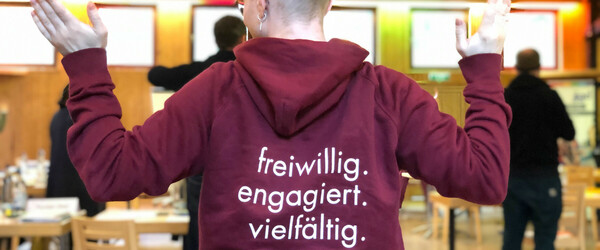Anti-discrimination
We are aware that, despite our best efforts and how we see ourselves as an organisation, we are not a space that is completely free from discrimination. Our work fighting discrimination promotes interactions that are based on equality, appreciation, self-reflection and solidarity.
Anti-discrimination officer
Our anti-discrimination officer is Shalina Marx. She is the organisation’s point of contact for any cases of discrimination and any questions you might have on this topic.
Who can turn to the anti-discrimination officer?
- volunteers
- voluntary workers
- employees
- members
of the ijgd.
What is offered:
- anonymous, confidential initial advice and information on where to go if you experience discrimination
- information about events dealing with the issue of anti-discrimination and discrimination in terms of prevention and intervention
- help with finding information about anti-discrimination and discrimination
- finding training courses on the topic

Contact
The anti-discrimination officer is our organisation’s central point of contact. We do understand, however, that deciding to get in touch isn’t always easy. For this reason, you can contact a person you may already know and trust and get in touch with Shalina Marx together. It is also important that you are able to remain anonymous. Unfortunately, it is not always possible for the anti-discrimination office to be available. Nevertheless, you can always send Shalina an e-mail or leave a message on her answering machine. She will get back to you as soon as possible.
Get in touch
Shalina Marx
ijgd Federal Office
Sedanstr. 75
30161 Hannover
+49 511 13 22 97 56
Good to know
You can also get in touch with the anti-discrimination officer in any of the following cases:
- If you feel unsure whether or not what you have experienced is really a case of discrimination. The most important thing is to report any situation or event that makes you feel stressed or uncomfortable and you need help.
- If you are unsure what you actually want to achieve going forward. The job of the anti-discrimination officer is to listen, understand and suggest ways forward.
- If you aren’t directly affected by discrimination, but still feel stressed or uncomfortable.
- If you believe that the person who has discriminated against you did not do so intentionally or is not aware of their actions. When discrimination happens, remember: The effect is more important than the intent. It is not the motive behind the discrimination that matters, but the effects of the discrimination. This means that, even if person A did not intentionally discriminate against person B, person B still feels bad. This situation is therefore the same as if the discrimination or injury was done intentionally.
Also important:
- Your feelings will not be judged. Your feelings are valid because you are experiencing them. The anti-discrimination officer is there to help you find out what can be done to help.
- People who cause discrimination can also feel uncomfortable. This can often be the case if the discrimination was not intentional. The anti-discrimination officer is also there for anyone who feels they have discriminated and want to change their behaviour. The officer will work together with you to develop strategies to help you better understand the perspectives of others.
Further information on discrimination
What is discrimination?
The word discrimination refers to the act of one or more people being disadvantaged in favour of one or more others. Discrimination can take many different and complex forms. The key element of discrimination is that equals are not treated equally.
Here is an example:
A teacher has 25 children in her class. Some of these children are from migrant families, others are not. Regardless of their abilities, the children from migrant families tend to get lower grades than the children who are not from migrant families.
However, disadvantages can also occur where inequalities are treated in the same way.
For example:
Two children are taking part in a race. One child is on crutches, the other is not. In this race, the only thing that matters is who crosses the finish line first. It is obvious that the child on crutches cannot run as fast as the other child who has two healthy legs. The physical requirements for winning the race are therefore not the same for both children and should not be treated equally.
Single discrimination, multiple discrimination, intersectional discrimination
Even though the German General Equality Act individually lists various characteristics of discrimination, the reality is that people are often confronted with discrimination due to several of these characteristics. It is possible to be discriminated against due to a disability (single discrimination), but also due to a disability and sexual orientation (multiple discrimination). The characteristics for which a person is discriminated against can often overlap, mesh and interact simultaneously. We describe this as intersectional discrimination. This perspective shows us that various forms of suppression and disadvantage do not simply add together, but rather are related and can influence each other. Between these forms of discrimination there are interrelations and interactions that must be urgently considered with regard to visibility and deconstruction of the associated relationships.
Why is discrimination not allowed?
German Basic Law gives all people the same rights. Disadvantages or advantages for persons based upon various characteristics are forbidden.
Article 3 (3) of the German Basic Law states:
No person shall be favoured or disfavoured because of sex, parentage, race*, language, homeland and origin, faith or religious or political opinions. No person shall be disfavoured because of disability.
*We prefer to distance ourselves from the term “race” as there are no different races of humans and use of this term in this context reinforces racist theories. Unfortunately, this term continues to be used in the wording of this law and which is why it is used in this quote.
The General Equality Law as a basis for anti-discrimination
The General Equality Law once again specifies the characteristics that are to be protected. This states that no person may be disfavoured due to
- their ethnic origin,
- their gender,
- their religion or world view,
- a disability,
- their age and
- sexual identity.
Exceptions are permitted based upon objective justifications that are also defined in the General Equality Law. For example, it is justified to treat two people differently if the same is to be achieved but where conditions for each person are different. This would apply if two people were to run a race where one of the participants has a physical disability and the other does not. If the same measures of performance are used for both people, then the person with the disability would be disadvantaged as a result of equal treatment. A person with a healthy body can run faster than a person who has had a leg amputated. This is an objective fact.
There are some aspects that are not covered by the General Equality Law. An example of this would be discrimination due to social background. We therefore consider the General Equality Law to be a framework that requires further work. Our understanding of the issues and our aim to fight discrimination and highlight the structures associated with it go beyond the scope of the General Equality Law.
Anti-discrimination at the ijgd
The work we do is intended to help people reflect on prejudices and stereotypes. We are creating a space in which people can become aware of things that can trigger and cause discrimination. We also want to provide a framework in which behaviours can be learned that can prevent and avoid discrimination. We want everyone who we deal with to feel comfortable, regardless of their background, sexual identity, belief, appearance and health. Through our work we hope to strengthen social interactions that bring together diversity, appreciation, awareness, reflection and solidarity.

